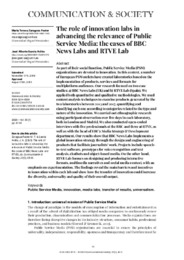Please use this identifier to cite or link to this item:
https://hdl.handle.net/11000/35150Full metadata record
| DC Field | Value | Language |
|---|---|---|
| dc.contributor.author | Zaragoza Fuster, Teresa | - |
| dc.contributor.author | García-Aviles, Jose Alberto | - |
| dc.contributor.other | Departamentos de la UMH::Ciencias Sociales y Humanas | es_ES |
| dc.date.accessioned | 2025-01-22T12:13:03Z | - |
| dc.date.available | 2025-01-22T12:13:03Z | - |
| dc.date.created | 2020 | - |
| dc.identifier.citation | Communication & Society, 2020 – Vol. 33(1) pp. 45-61 | es_ES |
| dc.identifier.issn | 2386-7876 | - |
| dc.identifier.uri | https://hdl.handle.net/11000/35150 | - |
| dc.description.abstract | As part of their social function, Public Service Media (PSM) organizations are devoted to innovation. In this context, a number of European PSM outlets have created laboratories based on the implementation of products, services and formats for multiplatform audiences. Our research focused on two case studies: a) BBC News Labs (UK) and b) RTVE Lab (Spain). We applied both quantitative and qualitative methodologies. We used content analysis techniques to examine products generated by the two laboratories between 2013 and 2017, quantifying and classifying each one according to categories related to the type and nature of the innovation. We carried out ethnographic research using participant observation over five days in each laboratory, both in London and Madrid. We also conducted open-ended interviews with five professionals at the BBC and three at RTVE, as well as with the head of EBU’s Media Strategy & Development department. Our results show that BBC News Labs implements a global innovation strategy through the design and engineering of products that facilitate journalists’ work. Projects include speechto- text software, prototypes for voice recognition and text analysis, chatbots and object-based media. On the other hand, RTVE Lab focuses on designing and producing interactive formats, multimedia narratives and social media content, with an emphasis on experimentation. The findings reveal the main barriers and incentives to innovation within each lab and show how the transfer of innovation could increase the diversity, universality and quality of their overall output | es_ES |
| dc.format | application/pdf | es_ES |
| dc.format.extent | 17 | es_ES |
| dc.language.iso | eng | es_ES |
| dc.publisher | Universidad de Navarra | es_ES |
| dc.rights | info:eu-repo/semantics/openAccess | es_ES |
| dc.rights | Attribution-NonCommercial-NoDerivatives 4.0 Internacional | * |
| dc.rights.uri | http://creativecommons.org/licenses/by-nc-nd/4.0/ | * |
| dc.subject | Public service media | es_ES |
| dc.subject | Innovation | es_ES |
| dc.subject | media labs | es_ES |
| dc.subject | transfer of results | es_ES |
| dc.subject.other | CDU::3 - Ciencias sociales::30 - Teorías y metodología en las ciencias sociales. Sociografía. Estudios de género | es_ES |
| dc.title | The role of innovation labs in advancing the relevance of Public Service Media: the cases of BBC News Labs and RTVE Lab | es_ES |
| dc.type | info:eu-repo/semantics/article | es_ES |
| dc.relation.publisherversion | https://doi.org/10.15581/003.33.1.45-61 | es_ES |

View/Open:
28. The role of innovation labs in advaning the relevance of Public Service Media the cases of BBC News Labs and RTVE Lab. (1).pdf
284,46 kB
Adobe PDF
Share:
.png)
